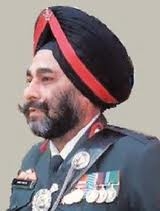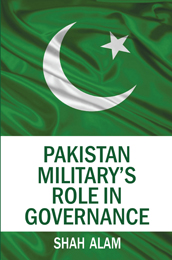Pakistan Military`s Role in Governance
| Author | : | Shah Alam |
| Year of Publication | : | 2012 |
| Publisher | : | KW Publishers Pvt Ltd |
| ISBN - 13 | : | 9789380502991 |
| Edition | : | First |
| Language | : | English |
| Binding | : | Hardcover |
| Subject | : | Foreign Affairs |
About the Book :
The book traces the genesis of Pakistan military’s role in
the governance of the country. With a focus on the military’s political role,
the book comprehensively explains the military’s intrusion into politics and
its implications. Governance in Pakistan is a complicated balancing act between
the elected civilian leaders and the military chiefs. Primarily, it is a
power-sharing arrangement in which the military has significant influence over
security, defence, foreign policy and domestic issues. Delineating on how
nuclear programme came under military control, the author states that the
military can and will influence the nature and direction of political change
even without directly assuming power.
Since inception, Pakistan faced several challenges – internal security, law and
order problems, financial and industrial constraints, and shortage of arms. The
continued political uncertainties and domestic disturbances resulted in the
expansion of functions performed by the military. The multi-dimensional role
played by the military due to weak civilian institutions, factionalism and
external challenges, accelerated its participation in the governance of the
country.
The early deaths of Mohammad Ali Jinnah and Prime Minister Liaqat Ali Khan
created a leadership vacuum. The successive prime ministers’ inability in
providing stable governments and continued political uncertainties provided
opportunities to the military directly to assume power. The military under the
leadership of Gen Ayub Khan assumed power in October 1958. The successive
military regimes (Gen Zia and Gen Musharraf’s regime) employed the same tools
in removing the elected civilian leaders. Judiciary strengthened the hands of
the military rulers by legitimising their coups through their verdicts, thus
playing a crucial role in strengthening and sustaining the Generals. The book
delves into the internal dynamics and external factors that increased the
influence of the military in Pakistan’s polity, economy and society.
About Author :
Shah Alam: Dr Shah Alam completed his Ph.D from the School of International Studies (SIS), Jawaharlal Nehru University (JNU), New Delhi, India. He has worked with the Institute of Defence Studies and Analyses (IDSA), the Centre for Air Power Studies (CAPS), and the Centre for Land Warfare Studies (CLAWS). Specialising on Iran, his areas of interest also includes Pakistan, Persian Gulf, West Asia and the Caspian Sea Basin. He has written a number of research articles on national security, foreign policy, defence, strategy, and energy security. He has recently published an Occasional paper titled, The Military Role in Pakistan Polity (New Delhi: KW Publishers, 2011). He has co-authored a monograph titled, Persian Gulf States and the 9/11 Attacks: An Analysis (New Delhi: Anamaya Publishers, 2004).







